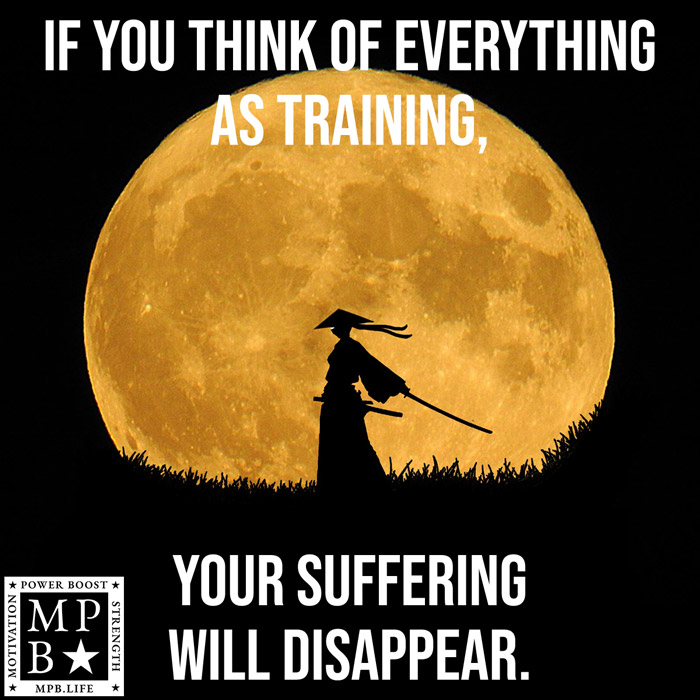
If You Think Of Everything As Training Graphic © motivationpowerboost.com
IF YOU THINK OF EVERYTHING AS TRAINING,
YOUR SUFFERIN GWILL DISAPPEAR.
The Training Mindset – A Path to Resilience and Growth
Life presents us with countless challenges, setbacks, and obstacles that can often lead to feelings of suffering and despair. However, by adopting a powerful mindset shift, we can transform these difficult experiences into opportunities for growth and personal development. The key lies in viewing everything as training—a perspective that can help us navigate the complexities of life with greater resilience and purpose.
When we encounter hardships, it’s natural to feel overwhelmed and discouraged. We may question our abilities, doubt our decisions, and wonder why we must endure such trials. But what if we chose to see these challenges as essential components of our personal training regimen? By reframing our mindset, we can begin to recognize that each obstacle is an opportunity to strengthen our character, develop new skills, and cultivate inner fortitude.
Just as athletes dedicate themselves to rigorous training to improve their performance, we too can approach life’s challenges as a form of mental and emotional conditioning. Every setback becomes a chance to practice patience, every failure an opportunity to learn and adapt, and every hardship a test of our resilience. By embracing this training mindset, we shift our focus from the pain of the moment to the long-term benefits of personal growth.
Moreover, when we view everything as training, we begin to understand that suffering is not a permanent state but rather a temporary condition that we can overcome. We start to see that our struggles are not meaningless burdens but rather essential stepping stones on the path to self-discovery and personal transformation. By accepting that challenges are an inevitable part of life, we can let go of the expectation that things should always be easy and instead embrace the process of continuous learning and growth.
Adopting this mindset also empowers us to take ownership of our lives and our reactions to adversity. Rather than feeling like helpless victims of circumstance, we recognize that we have the power to choose how we respond to the challenges we face. We can choose to view obstacles as opportunities for growth, to learn from our mistakes, and to cultivate the mental and emotional strength necessary to overcome future challenges.
In the end, by embracing the idea that everything is training, we open ourselves up to a world of endless possibilities for personal development and self-improvement. We begin to see that our suffering is not a permanent state but rather a temporary condition that we can learn from and ultimately transcend. By approaching life with this powerful mindset, we can cultivate the resilience, adaptability, and inner strength necessary to navigate the ups and downs of life with grace and purpose.
So the next time you face a challenge or setback, remember that it is all part of your training. Embrace the opportunity to grow, learn, and become a stronger, more resilient version of yourself. With this mindset, you will find that your suffering will gradually disappear, replaced by a sense of purpose, growth, and ultimate fulfillment.
Practical Strategies for Implementing the Training Mindset
While adopting the training mindset can be a powerful shift in perspective, putting it into practice may seem challenging at first. Here are some practical strategies to help integrate this mindset into your daily life:
1. Reframe Your Language: The words we use shape our thoughts and perceptions. Instead of describing challenges as “problems” or “setbacks,” consciously refer to them as “training opportunities.” This simple linguistic shift can prime your mind to approach difficulties with a growth-oriented perspective.
2. Practice Mindfulness: Cultivating mindfulness can help you stay present and observe your thoughts and emotions without judgment. When faced with a challenge, pause and take a few deep breaths. Observe your initial reactions without getting caught up in them. This practice can create space for a more constructive response aligned with the training mindset.
3. Seek Feedback: Just as athletes rely on coaches to identify areas for improvement, seek feedback from trusted sources in your life. Ask for constructive criticism and be open to suggestions for personal growth. Treat this feedback as valuable training data to help you refine your skills and approach.
4. Reflect and Learn: After navigating a challenging situation, take time to reflect on what you learned. Identify the skills you developed, the strategies that worked or didn’t work, and the insights you gained. Use these lessons to inform your approach to future challenges.
5. Celebrate Progress: While it’s essential to maintain a growth mindset, it’s equally important to acknowledge and celebrate your progress. Recognize the small victories and the incremental improvements you’ve made. This positive reinforcement can fuel your motivation and confidence as you continue your training journey.
6. Build a Support Network: Surrounding yourself with supportive individuals who share or understand the training mindset can be invaluable. Connect with others who embrace personal growth and can offer encouragement, accountability, and a shared perspective during challenging times.
Remember, adopting the training mindset is a journey, and it may take time and consistent effort to fully integrate it into your life. Be patient with yourself, celebrate small wins, and trust that each challenge you face is an opportunity to strengthen your resilience and develop a deeper sense of purpose and fulfillment.
Related Inspirational Quotes
“It’s not whether you get knocked down, it’s whether you get up.” – Vince Lombardi
“Strength does not come from physical capacity. It comes from an indomitable will.” – Mahatma Gandhi
“Adversity is the first path to truth.” – Lord Byron
“Pain is temporary. It may last a minute, or an hour, or a day, or a year, but eventually it will subside and something else will take its place. If I quit, however, it lasts forever.” – Lance Armstrong
“The wound is the place where the Light enters you.” – Rumi
